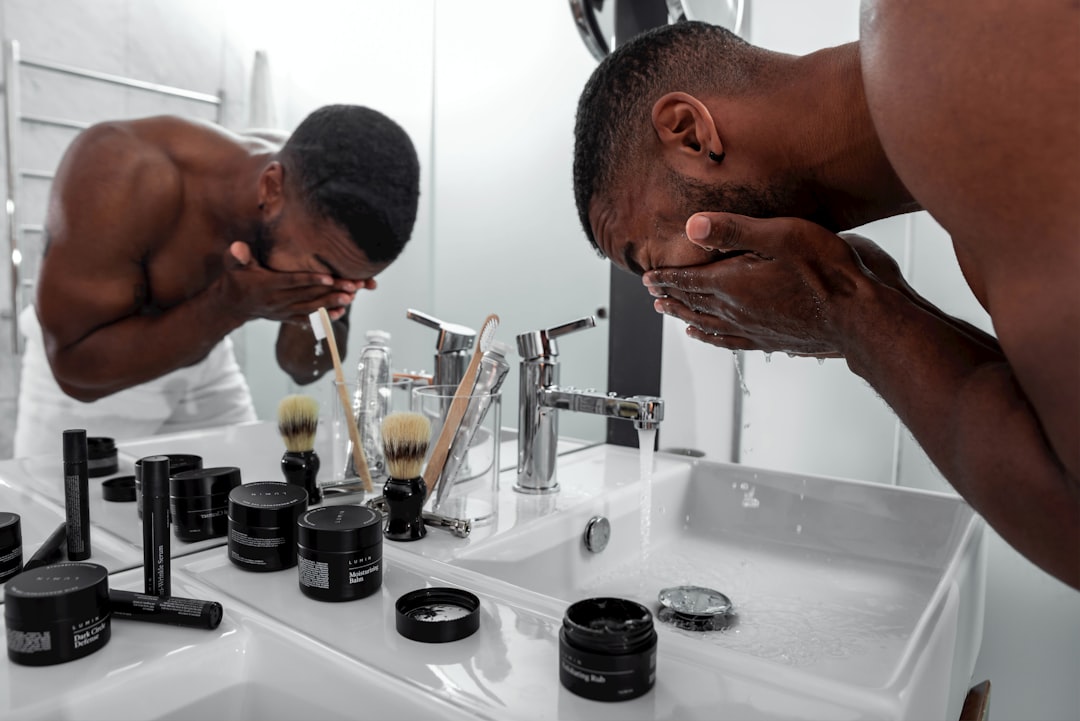Understanding your skin type is the first step in creating an effective skincare routine. There are generally four main skin types: normal, dry, oily, and combination. Normal skin is well-balanced, with small pores and few imperfections. Dry skin often feels tight and may appear flaky or rough. Oily skin is characterized by enlarged pores, a shiny complexion, and a tendency to develop acne. Combination skin is a mix of oily and dry, with an oily T-zone (forehead, nose, and chin) and dry cheeks.
It’s important to identify your skin type so that you can choose products that are specifically formulated to address your skin’s needs. For example, if you have oily skin, you’ll want to look for products that are oil-free and non-comedogenic to prevent clogged pores and breakouts. On the other hand, if you have dry skin, you’ll want to use products that are hydrating and moisturizing to combat flakiness and tightness. Understanding your skin type will help you make informed decisions about the products you use and ensure that you’re giving your skin the care it needs.
Summary
- Understanding your skin type is crucial for choosing the right skincare products and routine.
- Identifying your skincare concerns, such as acne, dryness, or sensitivity, will help you target specific issues.
- Reading and understanding product labels can help you avoid ingredients that may irritate your skin.
- Consulting with a skincare professional can provide personalised advice and recommendations for your skin.
- Patch testing new products is essential to check for any adverse reactions before applying them to your entire face.
- Monitoring your skin’s response to new products will help you determine if they are suitable for your skincare routine.
- Adjusting your skincare routine as needed is important to address changes in your skin or concerns.
Identifying Your Skincare Concerns
In addition to understanding your skin type, it’s important to identify any specific skincare concerns you may have. These concerns could include acne, fine lines and wrinkles, hyperpigmentation, sensitivity, or dehydration. By pinpointing your skincare concerns, you can tailor your routine to address these issues effectively.
For example, if you’re concerned about acne, you may want to incorporate products with salicylic acid or benzoyl peroxide into your routine to help clear up breakouts. If fine lines and wrinkles are a concern, you may want to use products with retinol or hyaluronic acid to help plump and smooth the skin. By identifying your skincare concerns, you can choose products that target these specific issues and work towards achieving your skincare goals.
Reading and Understanding Product Labels
When it comes to choosing skincare products, it’s essential to read and understand product labels. Product labels contain valuable information about the ingredients, usage instructions, and potential allergens or irritants. By familiarising yourself with product labels, you can make informed decisions about the products you use and avoid any ingredients that may be problematic for your skin.
Pay attention to the ingredient list and look for key ingredients that are beneficial for your skin type and concerns. For example, if you have dry skin, you may want to look for products containing ingredients like hyaluronic acid or glycerin, which are known for their hydrating properties. If you have sensitive skin, you’ll want to avoid products with potential irritants like fragrance or alcohol.
Additionally, understanding how to interpret product labels can help you determine the proper usage of the product. For example, some products may be intended for daily use, while others may be recommended for weekly or monthly use. By reading and understanding product labels, you can ensure that you’re using products correctly and maximising their benefits for your skin.
Consulting with a Skincare Professional
If you’re unsure about which skincare products are best for your skin type and concerns, it’s a good idea to consult with a skincare professional. A dermatologist or licensed esthetician can assess your skin and provide personalised recommendations based on your specific needs.
During a consultation, a skincare professional can evaluate your skin type, identify any concerns or conditions, and recommend suitable products and treatments. They can also provide valuable advice on how to care for your skin at home and offer guidance on building an effective skincare routine.
In addition to product recommendations, a skincare professional can also offer treatments such as facials, chemical peels, or laser therapy to address specific concerns. By consulting with a skincare professional, you can gain expert insight into caring for your skin and receive tailored recommendations that can help you achieve healthy, radiant skin.
Patch Testing New Products
When introducing new skincare products into your routine, it’s crucial to patch test them first to avoid potential adverse reactions. Patch testing involves applying a small amount of the product to a discreet area of the skin, such as the inner forearm or behind the ear, and monitoring for any signs of irritation or allergic reaction.
To patch test a new product, cleanse the area of skin where you’ll be applying the product and then apply a small amount of the product. Allow it to sit on the skin for 24-48 hours without washing it off. During this time, observe the patch test area for any redness, itching, burning, or swelling. If any of these symptoms occur, discontinue use of the product immediately.
Patch testing is especially important for individuals with sensitive or reactive skin, as it can help prevent potential adverse reactions before applying the product to the entire face or body. By patch testing new products, you can ensure that they are safe for use and minimise the risk of irritation or allergic reactions.
Monitoring Your Skin’s Response
After incorporating new products into your skincare routine, it’s essential to monitor your skin’s response to ensure that the products are well-tolerated and effective. Pay attention to how your skin looks and feels after using the new products and be on the lookout for any changes or reactions.
If you notice any redness, irritation, breakouts, or other adverse effects, discontinue use of the product immediately and consult with a skincare professional if necessary. It’s also important to give new products time to work before expecting to see significant results. Most skincare products require consistent use over several weeks before their full benefits are realised.
By monitoring your skin’s response to new products, you can make informed decisions about whether to continue using them or make adjustments to your routine as needed. Additionally, keeping track of how your skin reacts to different products can help you identify any potential triggers or sensitivities and refine your skincare routine for optimal results.
Adjusting Your Skincare Routine as Needed
As your skin changes over time or in response to different factors such as weather, hormones, or lifestyle habits, it’s important to adjust your skincare routine accordingly. For example, during the colder months, you may need to incorporate more hydrating products into your routine to combat dryness and protect against environmental stressors.
Similarly, if you experience changes in your skin such as increased oiliness or sensitivity, you may need to modify your routine to address these new concerns. This could involve switching out certain products, adjusting the frequency of use, or incorporating targeted treatments to address specific issues.
Regularly reassessing your skincare routine and making adjustments as needed can help ensure that your skin receives the care it requires at any given time. By staying attuned to your skin’s changing needs and being proactive in adjusting your routine accordingly, you can maintain healthy, balanced skin and address any concerns effectively.
Discovering the skincare routine that suits your needs can be a daunting task. However, with the right guidance, you can navigate through the plethora of options available. In a related article, “Navigating Men’s Skincare: Clearing Up Misconceptions and Establishing an Effective Routine,” you can explore tailored advice for men’s skincare needs. This insightful piece provides valuable tips and debunking myths to help men establish an effective skincare routine. Whether you’re looking for the perfect vitamin C ampoules or seeking safe skincare practices during pregnancy, Best Skincare Products has a wealth of resources to guide you on your skincare journey. Read more about it.
FAQs
What factors should I consider when choosing skincare products?
When choosing skincare products, it’s important to consider your skin type, any specific skin concerns you may have, the ingredients in the products, and any potential sensitivities or allergies you may have.
How can I determine my skin type?
You can determine your skin type by observing how your skin feels and looks throughout the day. Common skin types include normal, oily, dry, combination, and sensitive.
What are some common skincare ingredients to look for?
Common skincare ingredients to look for include hyaluronic acid for hydration, retinoids for anti-aging, salicylic acid for acne-prone skin, and antioxidants like vitamin C for overall skin health.
What are some red flags to look out for in skincare products?
Red flags in skincare products include high levels of alcohol, artificial fragrances, and harsh chemicals that can cause irritation or allergic reactions. It’s also important to be cautious of products that make exaggerated claims or promises.
How can I test if a skincare product is right for me?
You can test a skincare product by doing a patch test on a small area of your skin to check for any adverse reactions. It’s also helpful to try samples or travel-sized versions of products before committing to a full-sized purchase.
Should I seek professional advice when choosing skincare products?
If you have specific skin concerns or conditions, it’s advisable to seek professional advice from a dermatologist or skincare specialist. They can provide personalized recommendations based on your individual needs.




